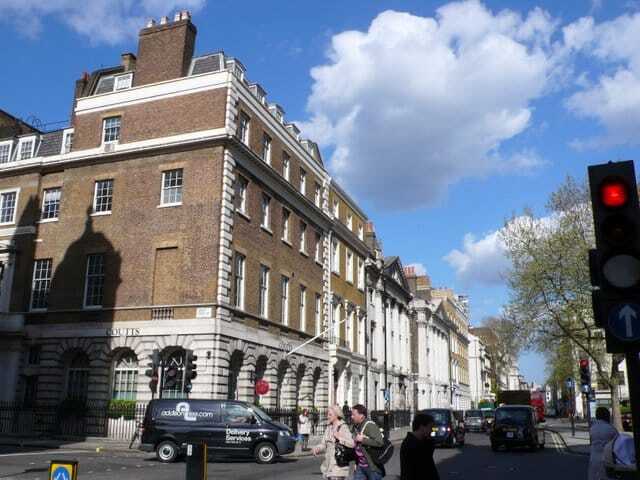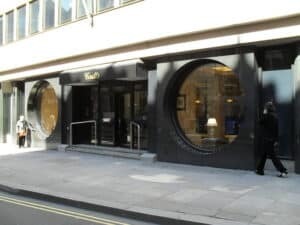Coutts Private Bank: A history and review
If you have any questions or want to invest as an expat or high-net-worth individual, you can email me (advice@adamfayed.com) or use these contact options.
It is my view that most private banks do not offer good value in 2023, compared to challenger banks and boutique wealth management firms.
Whilst this article will sometimes be updated, we can’t guarantee that everything written on the blog is accurate.
Introduction
Coutts & Co is a private bank specializing in wealth management and personalized services for high net worth individuals. Founded in 1692, the bank has offices across the world and provides services to customers worldwide.
In our view, due to the high minimum deposits, fees, and commissions with big banks, they are not good places to invest your money.
However, in this article we will discuss the history of Coutts Private Bank as one of the oldest banks in the world, how it has adjusted to modern day banking, and how it is performing as a private bank to help you make your own decision if it is right for you.

Should you consider opening an account with Coutts Private Bank?
Private banking is a high-quality service for wealthy people. It is a type of financial service that provides exclusive services to its clients, who usually have more than $1 million in assets.
For Coutts Private Bank, all UK clients and expats must borrow a minimum of £1 million or more to open an account, such as through a mortgage or an investment product offered by the company.
In private banking, you can find legal and tax assistance, investment guidance, confidentiality and confidentiality among other benefits. The disadvantages of this kind of service include high minimum deposits, fees and commissions.
A private bank offers you a wide range of wealth management services when you conduct business with them. Trust and estate planning, tax preparation, insurance, and investment and portfolio management are a few of these services.
Offering banking, lending, and wealth management services to high net worth individuals with connections to the UK and their commercial interests is Coutts & Co.’s main business. The bank intends to concentrate on providing the best client experience through a proactive engagement model as part of its declared objective.
In order to improve on returns, Coutts Private Bank promotes a client-centric strategy that aims to strengthen client connections and advance its digital banking capabilities. Interest on client loans, fees on client transactions, and revenue from our asset management service are all sources of income for the Group.
It also pays interest to clients who have placed interest bearing deposits with the bank.
Coutts & Co. is a subsidiary of NatWest Group plc, which supports and grants access to all its core resources.
As such, the bank leverages its connections to NatWest Holdings Limited (NWH Ltd), National Westminster Bank Plc (NWB Plc), and the NatWest Group, which consists of NatWest Group plc, its subsidiary, and associated undertakings for its services.
Coutts Private Bank performed quite well in recent years despite the global low interest environment, posting a recorded operating profit of £254 million, an increase compared with £127 million in 2020.
The bank said to have benefited from loan impairment releases of £57 million in the year driven by an improved economic outlook.
According to bank data, return on equity (RoE) increased by 5.9 percentage points to 12.5% while capital position was a Common Equity Tier 1 (CET1) ratio of 11.9% with positive growth seen across deposits, lending and investments.
Coutts Private Bank has been reported to have been a boon to its wealthy clientele during the pandemic, providing them with mortgage repayment breaks, assisted businesses with loans of up to £50 million through government programs, and organized online conferences featuring eminent public speakers from a variety of fields, including science, politics, real estate, and education.
During the height of COVID-19, it was also reported that the bank became into a kind of upscale emergency service, assisting in the repatriation of clients’ children who were stranded abroad on gap years and setting up emergency evacuations for clients who were left stranded abroad.
In recent years, Coutts Private Bank has also tried to adopt to digital trends, courting the wealth of young multimillionaires who have made their fortunes off the internet, as well as young celebrities.
While it might have found some success in attracting new clientele, it also seems to have met difficulties adjusting to expectations regarding their customer service.
A number of Coutts Private Bank clients are expressing their dissatisfaction on sites like TrustPilot and ReviewCentre, citing deteriorating customer relationships, inaccessible customer support, and an inadequate level of technology on its digital banking services.
Keep these factors in mind should you be interested in opening an account with the bank. We’ve also discussed the benefits and drawbacks of private banks below.
What are the benefits and drawbacks of investing in Coutts Private Bank?
Private banks are able to provide legal and tax advice on any aspect of your financial situation, including investment planning, estate planning and insolvency.
This includes assisting with the establishment of trusts or companies for members of the family who may not be able to manage their own affairs through traditional channels.
Private banks like Coutts also have access to additional investments that are not available in standard deposit accounts. This is on top of exclusive services such as 24/7 access via smart phone apps or other means so there is no waiting time before you are able to speak directly with someone about your finances.
Exclusive services are the most popular benefit of private banks. They allow you to choose your own financial advisors, and they can be a great way to get personalized attention when it comes to your finances.
Most private banks also come with the promise that its customers have privacy and confidentiality in relation to their finances.
The main advantage of using a private bank is that you can be sure that your personal information will not be shared with other people or companies, which means that there will be no unauthorized access.
This is important when it comes to protecting your privacy because not all banks are as diligent about keeping information confidential as they should be. Some banks sell personal data without authorization or even share it with third parties for marketing purposes (which may include targeted ads).
However, these advantages come with expensive costs. Private banking is one of the most expensive ways to manage your finances.
Opening an account at Coutts Private Bank alone needs a minimum investment of £1 million, aside from other fees and commissions.
You will pay a lot of money upfront for the services provided by your private banker or wealth manager—and then they may charge additional fees when you need to make changes in your plan or invest certain assets.
The high cost of private banking is one of the main disadvantages of this type of account because it makes it harder for people without experience managing their wealth and investments to learn how to invest.
Private banking is a high-quality service for wealthy people and their families. It’s not right for everyone, but it offers many advantages over other investing options. If you have a large amount of wealth, want personalized banking services and don’t mind the fees, it may be a great option for you.

What should I know about Coutts Private Bank and its history?
One of the oldest banks in the world, Coutts was founded in 1692 and has been providing wealth management, banking, estate planning and family offices to those who share their values ever since.
Young Scot John Campbell of Lundie established his goldsmith-banker business in the spring of 1692 at the sign of The Three Crowns in Strand, London. In addition to selling jewelry and plate, Campbell provided a full range of banking services, including bill discounting, loan making, and deposit taking.
Many of his clients were his countrymen, notably the formidable Duke of Argyll, the great leader of his clan.
When Queen Anne asked Campbell to create the collars and badges for the Order of the Thistle, royal patronage officially got underway. George Middleton, another Scottish jeweller, joined him as a partner in 1708. In the same year that John Campbell passed away (1712), Middleton wed Mary, the founder’s daughter.
When the English stock market crashed in 1720 and the Mississippi bubble burst, George Middleton was deeply involved in business dealings with John Law, a French financier, who owed a large sum of money to the bank. Middleton’s payout was stopped as a result for three years.
The younger son of the founder, George Campbell, joined Middleton in 1727, and in 1744 the bank welcomed David Bruce as a third partner. When Middleton passed away in 1747, the remaining partners simply referred to themselves as “Bankers of 59 Strand,” the bank’s location since 1739, as the goldsmith business had been in decline since the 1720s.
In 1755 was the name Coutts found in the bank’s name for the first time. Following his marriage to Mary Peagrum, the founder’s granddaughter, George Campbell invited James Coutts, a Scottish banker, to join the company.
James Coutts requested his youngest brother, Thomas, to join him after Campbell passed away in 1760, and in January 1761 the bank was renamed James & Thomas Coutts.
The name of the bank was changed to Thomas Coutts & Company after James retired in 1775; this name remained until Thomas’s passing in 1822.
Thomas, together with his partners Edmund Antrobus, Edward Marjoribanks, and Coutts Trotter, led the bank to success. The 59 Strand location’s facilities underwent a substantial expansion in the last ten years of the 18th century, and profits increased from £9,700 in 1775 to £72,000 in 1821.
There were significant political, social, and economic changes throughout George III’s protracted rule. The American War of Independence, the French Revolution, the Napoleonic Wars, and the opening up of India and the Far East were all significant moments in the lives of Coutts’ clientele.
When Thomas passed away in 1822, his second wife Harriot received his fortune and a 50% ownership stake in the bank. The bank then changed its name to Coutts & Co. Harriot (later Duchess of St. Albans), the senior partner, actively participated in the company.
She made the decision that upon her passing, the 50% part and Thomas’s riches should pass to a relative. As a result, Angela Burdett, the youngest of Thomas’s grandchildren at the age of 23, received the interest in a trust that comprised a half-share in the bank in 1837.
Angela was required by Harriot’s will to adopt the Coutts name, but she was prohibited from getting married to a foreigner or meddling with the family company.
In a world that was changing quickly throughout the Victorian era, the bank had to deal with fresh issues. Growing enterprises were in desperate need of capital, and the new, prosperous joint stock banks represented severe competition for the long-standing private banking firms.
There is little question that throughout his lifetime, Thomas Coutts’ name, reputation, and personal wealth inspired faith in the bank. Angela Burdett-Coutts served as the bank’s public face during the Victorian era as the heir to the Coutts name and riches.
Additionally, the high degree of confidence possessed by Coutts was maintained by the assistance of younger generations of the Marjoribanks and Antrobuse families as well as new names in the partnership, including Coulthurst, Ryder, and Malcolm.
Following careful deliberation, Coutts & Co. chose to alter its status after the Baring crisis of 1890 pushed several banks to reevaluate their situation. The bank ended the partnership in June 1892 and changed its legal status to an unlimited liability business.
After 165 years at 59 Strand, Coutts Private Bank moved to its current location at 440 Strand in 1904, signaling the beginning of more changes.
In 1906, Angela Burdett-Coutts passed away. The City bankers, Robarts, Lubbock & Co. were bought by Coutts in 1914, allowing it to open its first branch at 15 Lombard Street and achieve membership in the Clearing House.
By 1919, it was decided to merge with the National Provincial & Union Bank of England Ltd. since it was clear that Coutts could not effectively compete with larger banks or take advantage of the post-war market.
Coutts kept its name, leadership, and manner of service. Coutts later became a part of the larger NatWest Group as a result of the January 1969 merger of the Westminster Bank and the National Provincial.
As the 20th century progressed, Coutts added new locations and dramatically widened its geographic reach. In 1921, Park Lane welcomed the first West End branch outside of 440 Strand, and Coutts made its first out-of-town branch opening at Eton in 1961.
As one of the first banks to adopt machine-posted ledgers at the end of the 1920s, Coutts Private Bank likewise embraced contemporary technology. The first British bank to implement a completely computerized accounting system was Coutts in 1963.
By locating its activities in Geneva, Coutts Private Bank acquired international recognition in 1987. The Coutts Group was formed in October 1990 when Coutts and NatWest combined their existing businesses, which included Handelsbank, in order to improve their global representation.
The Royal Bank of Scotland’s private banking division, Coutts, was founded in 2000 following the acquisition of the NatWest Group.
Coutts Private Bank now has 14 offices across the UK, with services in the Channel Islands.
Pained by financial indecision? Want to invest with Adam?

Adam is an internationally recognised author on financial matters, with over 760.2 million answer views on Quora.com, a widely sold book on Amazon, and a contributor on Forbes.



